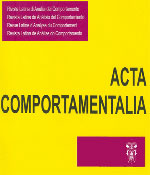Is “refraining” from eating free food a case of self-controlled behavior in pigeons?
DOI:
https://doi.org/10.32870/ac.v19i3.28041Keywords:
T cycle, food presentation, eating behavior, self control, pigeonsAbstract
Self-controlled eating behavior was studied in three food-deprived pigeons exposed to a procedure consisting on fifty 64-s time cycles (T cycles). In each cycle a food-hopper was always presented once for 3 s (SR1) and could be presented for other 3 s (SR2) after the T cycle elapsed, according to the following contingency. If the subject approached to SR1 it was withdrawn and SR 2 delivery was cancelled; otherwise SR2 was presented when the T cycle elapsed. In five experimental phases SR1 was presented 3, 32, 16, 8, and 3 s before the end of the T cycle. Additionally, according to an ABA-design, a color change of a response key signaled (conditions A1 and A2) or not (condition B) SR1 presentations and served as a distracting operandum. It was found that the number of SR2 obtained was lower as SR 1 was presented closer to the beginning of each T cycle, regardless of signaling SR1 presentations. It was also found that only in the A conditions of the first experimental phase (3 s) SR1 interruptions were relatively low and R>0 of key pecks was comparatively high. Globally, these results replicated and extended those of previous studies in which self-controlled eating behavior was explored.Downloads
Download data is not yet available.
Downloads
How to Cite
González, J. C., Ávila, R., Juárez, A., & Miranda, P. (2011). Is “refraining” from eating free food a case of self-controlled behavior in pigeons?. Acta Comportamentalia, 19(3). https://doi.org/10.32870/ac.v19i3.28041
Issue
Section
Articles
License

<a rel="license" href="http://creativecommons.org/licenses/by-nc-sa/4.0/"><img alt="Licencia de Creative Commons" style="border-width:0" src="https://i.creativecommons.org/l/by-nc-sa/4.0/88x31.png" /></a><br />Este obra está bajo una <a rel="license" href="http://creativecommons.org/licenses/by-nc-sa/4.0/">licencia de Creative Commons Reconocimiento-NoComercial-CompartirIgual 4.0 Internacional</a>.






